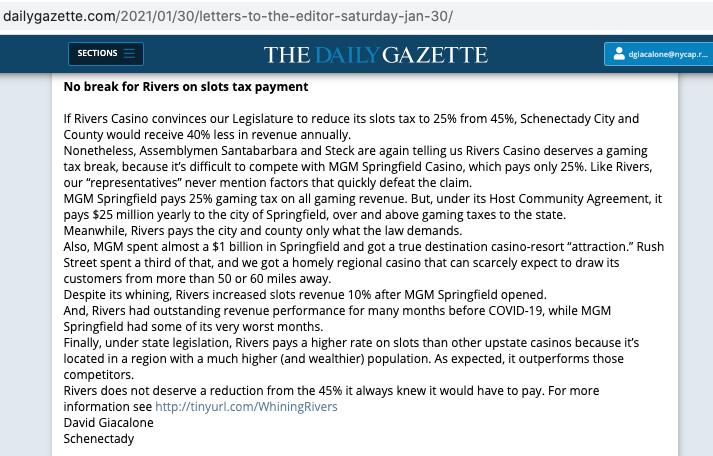. . there are lots of reasons to say NO . .
The issue of reducing the gaming tax rate Rivers Casino must pay on slots revenue is back in the news and again threatening to harm Schenectady’s finances. See “Rivers Casino in Schenectady could benefit significantly from Cuomo proposals” Daily Gazette, John Cropley, Jan. 23, 2021). Gov. Andrew Cuomo’s new executive budget summary includes a provision that would allow Rivers to petition the state to cut its tax on slot machine revenue to as little as 25 percent, from its current 45% level. As the Gazette article pointed out:
In the last normal fiscal year, before COVID, Rivers generated $57.9 million in tax revenue, 91 percent of it from slots; the city and county of Schenectady each got 5 percent of this, or $2.9 million.
If approximately 90 percent of tax revenue to the State, City and County is from slots, reducing the slots tax rate from 45% to 25% (which amounts to a forty-four percent reduction in the tax on slots), would mean about a 40% reduction in overall gaming tax payments to the State by Rivers Casino, with the same reduction to the City and County (and neighboring non-host counties). Similarly, reducing the slot tax rate to 35% from 45% would mean about a 20% reduction in the gaming taxes paid by Rivers Casino.
- My arguments for refusing such tax cuts are set forth at length, with links to relevant materials, in “Rush Street must think we are all pretty stupid” (March 29, 2019) and “Not again, Mr. Steck!“ (June 19, 2019). My main point: The 45% rate is not keeping Rivers Casino from competing against MGM Springfield, which is located 104 miles away. The Springfield casino pays a gaming tax rate of 25%, but also pays $25 million annually to the City of Springfield, under the Host Community Agreement between the City and the Casino. Massachusetts has structured its casino revenue tax differently, putting far more money in the hands of the host community.
A quick summary of the major points is found in a Letter to the Editor in the Daily Gazette, Saturday, Jan. 30, 2021, at C7:

NO PANDEMIC EXCUSE. At a time of pandemic-induced fiscal crisis for the State and its municipalities, it does seem strange to give Rivers Casino a large tax break. Are there nonetheless any pandemic-related equities that would make such a tax break reasonable, despite the harm to the treasuries of NYS and Schenectady? Lots of businesses had to close down or reduce their level of operation, due to COVID-19 restrictions. Rivers Casino, which imposed major furloughs on its employees, had 55% lower gaming revenues in 2020. While, MGM Springfield revenue declined by 52% (see Gazette article). However, River Casino’s owner, Chicago-based Rush Street Gaming, with its billionaire CEO Neil Bluhm, has not suggested their Schenectady Casino will have to fold, unless it gets the very indirect and delayed benefits of a permanent gaming tax reduction.
If tax breaks or direct payments are going to be used to help local businesses hurt by COVID-19, we should be starting with assistance to those who need it to survive, not those with deep pockets, whose profits are sent mostly out of state. If Schenectady wanted to help such small businesses it could be hampered by the fear of losing gaming tax revenue from Rivers Casino.
Assemblymen Angelo Santabarbara and Phil Steck (seen with shovels, State Senator Jim Tedisco, in the first image above at the Casino groundbreaking) should make sure the public and legislative colleagues know that Rivers Casino is not losing business to MGM Springfield because of their different tax rates on slots. The transfer of slots gaming tax revenue from the City and County of Schenectady and their taxpayers to Rivers Casino can only be a net loss for our community.


